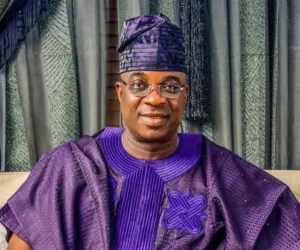By Sani Idris Abdulrahman, News Agency of Nigeria (NAN)
Nigeria’s fashion industry is quietly creating a new narrative; one where creativity meets sustainability and tradition meets technology.
Beyond glamour, the sector is becoming a growing contributor to national development, in spite of facing structural challenges.
According to data from the National Bureau of Statistics (NBS), the textile, apparel, and footwear subsector contributed N1.224 trillion to Nigeria’s GDP in 2024, representing about 1.63 per cent of the total GDP.
However, this marks an 8.1 per cent contraction from N1.332 trillion recorded in 2020.
Industry analysts attribute this decline to high import dependence and limited investment in local textile production.
A report by Fibre2Fashion shows that Nigeria’s textile imports surged by nearly 300 per cent within five years; rising from N182.5 billion in 2020 to about N726.18 billion in 2024.
Stakeholders warn that without deliberate policy support, the country risks losing out on the global shift towards sustainable and circular fashion economies.
Albeit these challenges, there is renewed optimism.
The Minister of Art, Culture and the Creative Economy, Barr. Hannatu Musawa, recently reaffirmed that the creative industry; including fashion contributes over $6.1 billion to Nigeria’s GDP.
Thus, creating millions of jobs for women and youth.
She said investments in sustainability could transform the industry into a major non-oil export earner.
“Fashion is not just about beauty; it is a form of cultural diplomacy and economic empowerment.
“With the right infrastructure and support, Nigerian designers can lead Africa’s green fashion movement,” Musawa said.
Across the globe, designers, consumers, and innovators are embracing sustainability not as a passing trend but as the future of fashion itself.
From biodegradable fabrics to regenerative cotton farms, the movement is reshaping how garments are made, sold, and worn.
In Kaduna, that movement is finding new expression.
Local designers are exploring eco-friendly fabrics, repurposing waste materials, and reviving traditional craftsmanship to create fashion that tells both cultural and environmental stories.
For instance, Goje Ibrahim, founder of Goje Styles, said sustainable fashion offers a bridge between creativity and responsibility.
“Using locally sourced fabrics reduces waste and supports the economy while keeping heritage alive.
“Many customers now ask where our materials come from. They want fashion that doesn’t harm the environment,” he explained.
Ibrahim, however, said affordability remains the biggest barrier.
“We want to produce green fashion, but sustainable materials are costly. Government support could make a big difference,” he said.
For Fatima Yahaya, a fashion design student at Kaduna Polytechnic, sustainability is also about innovation.
She said she is experimenting with dyeing methods that use natural pigments from plants instead of chemical dyes that pollute water sources.
“It forces us to think differently about style and waste. That is where creativity begins,” she said.
Yahaya believes these efforts are changing mindsets.
“We are teaching people that fashion is more than what you wear; it is what you stand for,” she said.
Globally, the urgency for change is clear.
The fashion industry accounts for up to 10 per cent of global carbon emissions, prompting consumers to demand more ethical and environmentally responsible production.
In 2025, sustainability is no longer an afterthought in fashion; it has become the central narrative.
Major brands are cutting waste, tracing their materials, and turning to renewable energy. Independent designers are transforming discarded textiles into wearable art.
Emerging materials are also driving much of this transformation.
Mushroom leather, pineapple fibre, and fabrics made from seaweed are redefining luxury, as designers now view bio-based textiles as beautiful alternatives to polluting synthetics.
Kaduna-based designer Hauwa Bello said her label has begun using leftover fabrics to create new accessories instead of throwing them away.
“We turn scraps into earrings, belts, and patchwork jackets; nothing goes to waste anymore.
“People love the idea that fashion can be both beautiful and responsible,” she added.
Technology is also reshaping the movement.
Around the world, blockchain systems trace garments from farm to shelf, ensuring transparency, while artificial intelligence helps predict demand to prevent overproduction.
In Kaduna, smaller fashion houses are adopting digital design tools to minimise waste.
Some use virtual sketches to perfect patterns before cutting fabric, saving both resources and money.
Beyond technology, a cultural awakening is unfolding.
Consumers, especially Gen Z and millennials, are redefining what it means to dress well.
They now view sustainable choices as fashionable and morally fulfilling.
Slow fashion, once niche, has become a powerful statement.
People are buying fewer clothes but choosing quality over quantity.
In Kaduna’s markets, tailors are seeing customers return for repairs instead of replacements.
Esther Ibrahim, a tailor at Central Market, said more clients are asking for alterations instead of buying new clothes.
“They want to keep what they have. This was how our mothers lived before, it is coming back,” she said.
Stakeholders insist that sustainable fashion is not just about the environment. but also about people.
They say fair wages, safe working conditions, and respect for artisans are now central to what makes a fashion brand ethical.
Still, challenges persist.
Eco-friendly materials can be expensive, and access to them in Nigeria is limited.
Many Kaduna designers struggle to find local suppliers who can provide sustainable fabrics in bulk.
Yet, in spite of these hurdles, optimism runs high.
Across Kaduna, fashion collectives and small enterprises are educating consumers about conscious dressing and waste reduction through pop-up shows and campus exhibitions.
In his final words, fashion expert Aliyu Tukur noted that sustainable fashion is transforming both global and local aesthetics.
He said designers are increasingly embracing natural colours, earthy tones, and handcrafted textures, turning imperfection into a mark of authenticity and environmental awareness.
Tukur added that consumers are now the real drivers of change through their conscious choices, while Kaduna’s designers are showing that sustainability is deeply rooted in Africa’s long-standing culture of reuse and resourcefulness.
He concluded that the future of fashion, in Kaduna and beyond, is circular, ethical, and full of promise. (NANFeatures)
****If used, please credit the writer and the News Agency of Nigeria.








